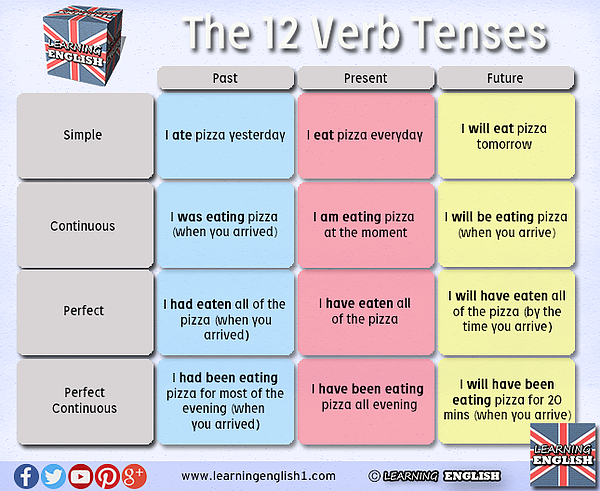
For action that.12 Verb Tenses in English Grammar (Definition, Formula & Examples)The Perfect Verb Tenses.
We are in the process of completing units 3 and 4, and will be periodically updating this section of the website. Unit 1: Using the Verb 'Be' Perhaps the most important verb in the English language is the verb 'To be.' English speakers use this verb to express. The Twelve Verb Tenses of English.

They all had finished their work before they went. Read carefully and note the usage of past perfect tense in the passage.Last weekend, Madhavi and her friends had beento the newly opened mall. The actions in this paragraph relate to two events that had taken place one before the other, but at a time in the past. The past tense form of ‘to be’ – known as helping verb or auxillary verbThe structure of the sentence: Affirmative sentences:-Subject + helping verb + main verb + objectSubject+ had + main verb (in past participle form) + objectExample: Farah had completed her homework.In case of two events one happening after the other:Subject + helping verb + (event 1) main verb (past participle form) + link + object + (event 2) main verb (in simple past form)Example: The sun had set before the party started.Event 1: The sun set (in past perfect tense)Event 2: The party began (in simple past tense)Linking these events: before Interrogative sentences:-Helping verb + subject + main verb + objectHave/has + subject + participle form of main verb + objectExample: Had Farah completed her homework? Negative sentences:-Subject + helping verb + NOT – main verb + objectSubject + had NOT + participle form of main verb = objectExample: Farah had not completed her homework.The paragraph given below describes Madhavi’s experieces at a mall. The past perfect tense form of a verb has two parts: Any action or an event that started in the recent past and express idea of completion or occurence, in relation to another event, without an exact time of its completion is in the past perfect tense.Past perfect is also used for actions completed in the recent past, not a very long time ago.
They liked this dress as soon as they had entered the mall. Madhavi and Roopali had already selected a beautiful dress to buy. They had never imagined that a get-together and outing of this kind would be so much fun. They had to cancel their plans. Each time they had planned, some other work came up.
They were exhausted because they had walked through the complete mall. By the time they left the mall, they had seenamazing displays in each of the shops. They had orderedfor fresh, cheezy pizzas, even before the others finished their shopping.
When there is a mention of an action completed in the past.Example: Last weekend, Madhavi and her friends had been to the newly opened mall. So, actions that took place first – are in the past perfect tense and the actions that took place later are in simple past tense. In both the above sentences, there are two distinct actions taking place, both in the past – ordering the pizza and walking through the mall happened before finishing shopping and feeling exhausted. They were exhausted because they had walked through the complete mall. The earlier action is in the past perfect tense form while the later action is in simple past.Example: They had ordered for fresh, cheezy pizzas, even before the others finished their shopping. When we mention two events happened sometime in the past, one before the other.


 0 kommentar(er)
0 kommentar(er)
